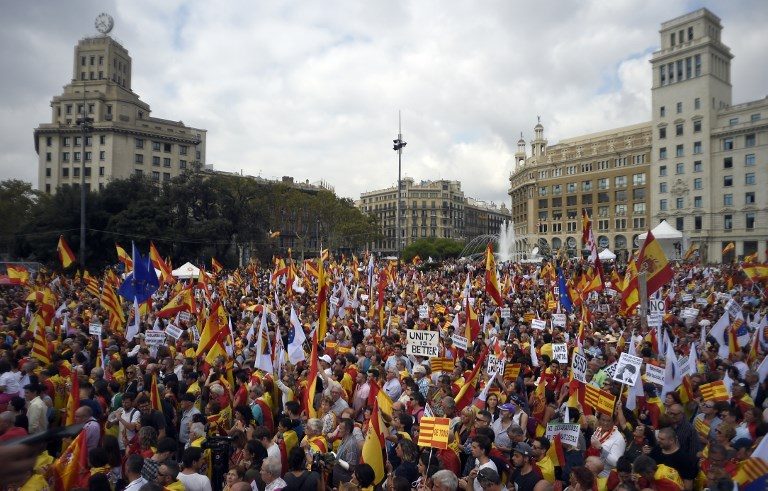SUMMARY
This is AI generated summarization, which may have errors. For context, always refer to the full article.

MADRID, Spain – Spain celebrated its national day Thursday, October 12, with a show of unity in the face of Catalan independence efforts, a day after the central government gave the region’s separatist leader a deadline to abandon his secession bid.
But events were overshadowed when a Eurofighter jet crashed about 300 kilometers (180 miles) southeast of Madrid while returning to base after taking part in a traditional military display, killing the pilot.
To mark the national holiday, Prime Minister Mariano Rajoy and King Felipe VI attended the parade in central Madrid as the country struggles with its worst political crisis in a generation.
Armed forces marched along Madrid’s Paseo de la Castellana boulevard to commemorate the day that Christopher Columbus first arrived in the Americas in 1492.
Separate pro-unity rallies, including one by members of a far-right movement, were organized in the Catalan capital Barcelona.
Waving the flag
In Madrid, cheering crowds lined the streets, waving red and yellow Spanish flags and some crying “Viva Espana!” as air force jets and helicopters swooped overhead.
Some teenagers climbed trees to get a better look as thousands of troops, vehicles – and even a khaki-capped brown billy goat – paraded through central Madrid.
“I love to see people waving our national flag,” said Beatriz Trapero, who was watching with her husband.
“There used to be a certain shyness in showing it but now it seems not so much.”
Rajoy’s government says it is ready to take control of the region after Catalan president Carles Puigdemont’s announcement Tuesday, October 10, that he accepted a mandate for “Catalonia to become an independent state”.
But he immediately suspended the declaration, calling for more time for talks with Madrid.
Rajoy responded that Puigdemont had until next Monday, October 9, to decide if he planned to push ahead with secession and then until next Thursday to reconsider, otherwise Madrid would trigger constitutional steps that could suspend Catalonia’s regional autonomy.
An influential pro-independence group, the Catalan National Assembly which has staged massive demonstrations in favor of secession in the past, called on Puigdemont to lift the suspension of the independence declaration, saying in a statement Thursday that it made no sense to keep it “given Spain’s rejection of any dialogue”.
‘Not peaceful, not free’
World leaders are watching closely and uncertainty over the fate of the northeast region of 7.5 million people has damaged business confidence, with several listed firms already moving their legal headquarters out of Catalonia.
Ratings agency Standard and Poor’s said the region’s economy risked sliding into recession if the crisis dragged on long term.
Catalonia is deeply divided on the issue, with polls suggesting Catalans are roughly evenly split on whether to go it alone.
While Puigdemont insists the October 1 referendum gave him a mandate for independence and has said he still wants dialogue with Madrid, Rajoy has rejected calls for mediation and refuses to negotiate on anything until the separatists abandon their independence drive.
“It is not peaceful, it is not free, it will not be recognized by Europe and now everyone knows it will have costs,” he told lawmakers.
Rajoy’s announcement of the deadline was a preliminary step towards invoking article 155 of the Spanish constitution, which allows Madrid to impose control over its devolved regions – an unprecedented move that some fear could lead to unrest.
“We ask for dialogue and they answer by putting article 155 on the table. Understood,” Puigdemont tweeted late Wednesday, October 11.
‘Excessive force’
In Madrid, the largest cheer of the day was reserved for a police car driving the parade route, complete with a sniffer dog riding on the bonnet.
Spanish police have come in for international criticism for their violent conduct during the banned October 1 referendum that saw Catalan voters opt to split from Spain.
Human Rights Watch on Thursday accused the police of using “excessive force” during the vote, including hitting people with batons in the legs, arms and face.
While separatist leaders say 90% of voters opted to split from Spain in the referendum, less than half of the region’s eligible voters actually turned out.
Several rallies also took place in Barcelona on Thursday.
Around 150 gathered to march against secession from Barcelona’s Plaza de Espana, flanked by Catalan police and waving Spanish and far-right nationalist flags.
Marchers chanted: “Puigdemont, go to jail” and “Rajoy, Rajoy, traitor, defend the nation.”
Pro-unity demonstrators held other rallies in Barcelona, following a mass demonstration against Catalan independence at the weekend.
Catalonia, which accounts for about one-fifth of Spain’s economic output, already enjoys significant powers over matters such as education and healthcare.
Puigdemont insisted Wednesday that “the majority of Catalan people want Catalonia as an independent state.” Rajoy dismissed his plan as “a fairytale”. – Rappler.com
Add a comment
How does this make you feel?





There are no comments yet. Add your comment to start the conversation.